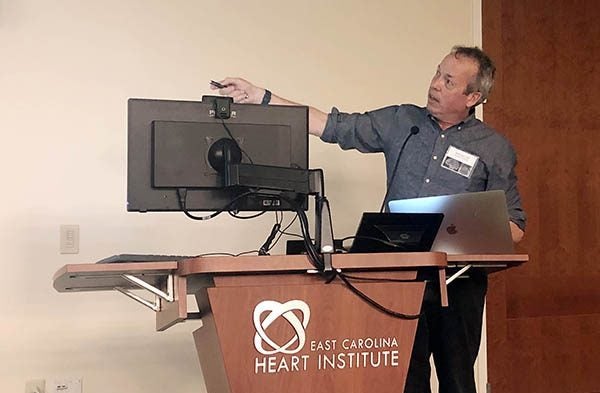Neuroscience symposium features ECU medical school alumnus turned Harvard researcher
A Brody School of Medicine alumnus revisited his roots recently when he headlined a neuroscience symposium on campus.
The Eastern Carolina Chapter of the Society for Neuroscience (ECCSfN) held its 23rd Annual Neuroscience Symposium on Oct. 29 at the East Carolina Heart Institute at East Carolina University. The event offered attendees a line-up of talks and presentations from neuroscience experts from Harvard University, UNC-Chapel Hill, North Carolina State University, National Institute of Environmental Health Sciences and ECU. Research poster sessions and lightning talks were also presented by ECU undergraduate and graduate students.
Keynote speaker Dr. David Ginty, a 1989 Brody School of Medicine graduate, is the Edward R. and Anne G. Lefler Professor of Neurobiology at Harvard Medical School and Howard Hughes Medical Institute (HHMI) Investigator. He presented, “Beauty is Skin Deep: The Sensory Neurons of Touch.”
Visit this video on YouTube for closed captioning.
Ginty’s work centers in the study of the sense of touch to better understand why touch is painful in a variety of diseases.
“I’m interested in how the nervous system gives rise to the perception of complex tactile experiences,” Ginty said. “There are many, many dimensions to touch and the nervous system is very complex. The neurons of touch are varied and collectively they give rise to this rich experience. I’m interested in how the nerve cells of touch encode different components of touch, vibration, indentation, deflection of hairs, that collectively give rise to our perception of the richness of the tactile world.
A better understanding of how touch impacts pain and symptoms in disease could lead to therapeutics that improve patient outcomes and provide higher quality care.
“In neuropathic pain states, for example, light touch, which is normally perceived as innocuous, becomes aversive, so why is that?” Ginty explained. “What changes in the nervous system to underly chronic pain where normally, innocuous stimuli become aversive? So, we’ve made some insights into that and great strides into understanding that. It’s basic science, but with curiosity-driven science providing the framework for advancing and understanding disease, therapeutic opportunities for disease and providing clinics with new tools to combat disease.”

Brody alumnus and keynote speaker Dr. David Ginty presented “Beauty is Skin Deep: The Sensory Neurons of Touch” at the 23rd Annual Neuroscience Symposium on Oct. 29. (Photo by Rob Spahr)
A greater body of knowledge in the science of touch could even help children with autism — and their caretakers — better cope with everyday life.
“There’s a whole other spectrum of somatosensory disorders that we are interested in, such as children with autism spectrum disorders are aversive to light touch,” Ginty said. “One of the chief complaints of parents and caretakers is that the child doesn’t like to be held or hugged. A sub-set of these patients cannot tolerate their hair being cut. So why is that? By understanding the normal neurobiological mechanisms of touch, we can understand why touch becomes aversive during disease states such as autism and maybe figure out ways of combatting that.”
During his visit, Ginty had the opportunity to interact with students and reflect on his time at Brody.
“It’s home,” he said of Brody. “It was 1989 that I graduated, which seems like yesterday, but it was 32 years ago. It’s where I came of age in many ways, certainly as a scientist, and it’s amazing to be here.”
Ginty said his affinity for Greenville and North Carolina remain as well, because of the talents and kindness of the people on campus and in the community — which he has not forgotten as his career grew and his scientific reputation evolved.
“The success I’ve had in my career I attribute to my coming of age as a scientist here at Brody,” he said. “It gave me the confidence and my abilities to move forward and the skills I needed. That’s why it’s home. It’s home for me personally and scientifically.”